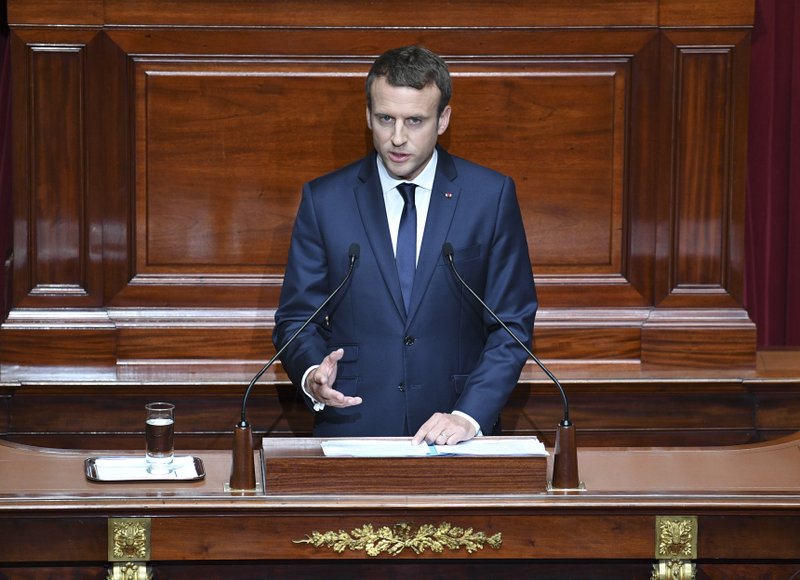PARIS -- French President Emmanuel Macron vowed Monday to lift a state of emergency that has been in place since 2015, but also to harden permanent security measures to fight Islamic extremism and other threats.
Macron has said little since his election on May 7, but he spoke for more than an hour to a rare joint session of the French Parliament at Versailles, laying out his political, security and diplomatic priorities.
Macron said his government "will work to prevent any new attack, and we will work to fight [the assailants] without pity, without regrets, without weakness."
At the same time, he insisted on the need to "guarantee full respect for individual liberties."
For his five-year term, Macron vowed to maintain France's military interventions against extremists abroad, especially in Africa's Sahel region and in Iraq and Syria. He also insisted on the importance of maintaining "the path of negotiation, of dialogue" for long-term solutions.
In his bid to strengthen the European Union after Britain's vote to leave, he announced Europe-wide public conferences later this year in an effort to reinvigorate the bloc.
He said he understood why many Europeans see the EU as bureaucratic, distant and uncaring.
"I firmly believe in Europe, but I don't find this skepticism unjustified," he said.
He added that European countries should work more closely to help political refugees while fighting the smuggling of migrants, and said Europe should strengthen its borders against illegal migration.
He praised France's cultural heritage, and he warned against those "democracies, longtime allies, now menacing the established order" -- a comment that critics said was a dig at U.S. President Donald Trump.
Macron has pledged to fulfill his campaign promise to bring about deep changes in France, notably through changing the nation's labor codes and through a series of measures to put more transparency and ethics into politics.
He said French voters no longer accept the conflicts of interest and corruption scandals that "used to seem almost normal" in the country's political landscape.
He notably vowed to end the special court, mostly composed of lawmakers, that judges government members for crimes committed while in charge. They will be judged by regular judges, with a procedure to deter politicians from using courts to attack rivals.
Macron also wants to reduce the number of seats in parliament -- which now stand at 925 -- by one third. He also wants to see fewer laws.
"Let's try to put an end to the proliferation of legislation," he said.
He promised to gather both houses of parliament in Versailles every year, to be accountable.
"The reforms and deep changes I have promised will be implemented," he said.
Critics who fear Macron is trying to amass too much power organized protests over Monday's event.
Lawmakers from the far-left party of Jean-Luc Melenchon and communists decided not to attend the speech in protest against what they call a "presidential monarchy," citing in particular his plans to overhaul labor codes.
Macron has also been criticized for slighting references to residents of France who are less fortunate or not economically successful. That criticism did not appear to faze him in Monday's speech.
"Protecting the weakest" should not make of them "permanent wards of the state," he said.
"Certainly, we've got to recognize the essential role of public service, and of our civil servants," he said. "But protecting the weakest doesn't mean transforming them into helpless minors. Every French person has a responsibility and a role to play in the conquests to come."
Information for this article was contributed by Sylvie Corbet and Angela Charlton of The Associated Press; and by Adam Nossiter of The New York Times.
A Section on 07/04/2017

